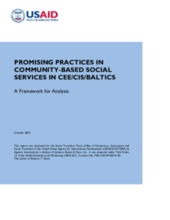This report, prepared for the Social Transition Office of the USAID Bureau of Europe and Eurasia, is the result of a desk top study—a secondary analysis of regional and country-specific reports on the evolution of family-focused, community-based social services for vulnerable groups in the region. Paralleling the region’s transition from a command economy to a market oriented society is a shift in the social contract from a state to a shared state-community responsibility for care of vulnerable groups. This study provides a framework for analyzing common elements in the transition of the social service delivery system that cut across different vulnerable groups. The report identifies internationally recognized standards of practice and describes examples of promising practices in community-based social services emerging in the region.
This study is both informational and analytical. It reviews various reports, assessments, and evaluations of policies, programs, and services in the region and draws conclusions based on reported findings and recommendations. As governments and donors experience shrinking resources, managing investments for long-term gain becomes increasingly important. This information and analysis can be used to inform advocates and political and professional leaders about progress and strategic interventions that incorporate multiple levels of system reform, thereby increasing the potential for sustainable change.
This report on promising practices focuses specifically on the four groups of special interest to the Social Transition Office at USAID: children and youth, disabled people, elderly persons, and Roma as a minority group. Special attention is given to elements in the transformation of systems of care including de-institutionalization, decentralization, targeting of benefits and services, economic and vocational development, human resource development, development of standards, and social inclusion. A primary goal of this paper is to communicate a sense of hopefulness that positive change is occurring in the midst of economic and political turmoil.
©USAID

